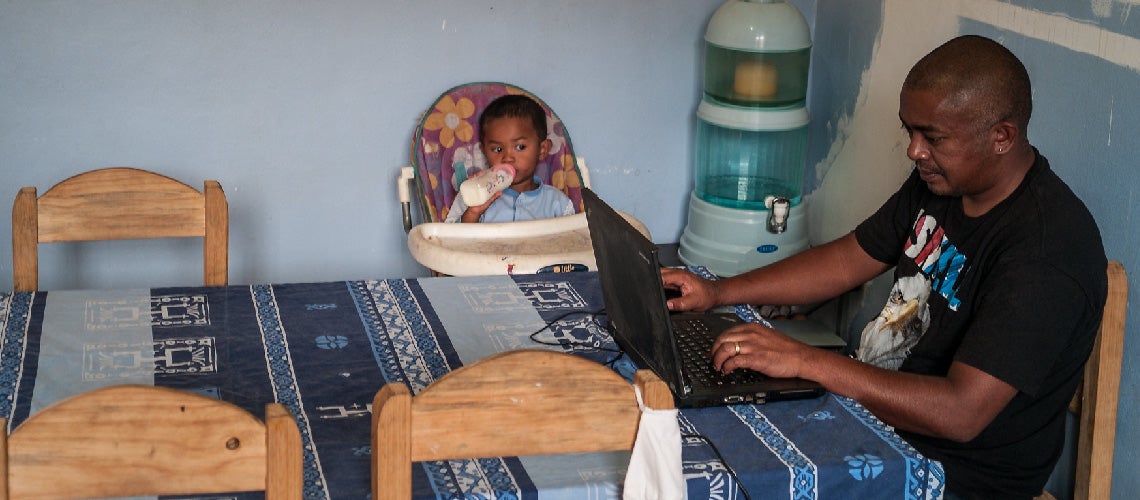 Working from home during the COVID-19 pandemic. © World Bank / Henitsoa Rafalia
Working from home during the COVID-19 pandemic. © World Bank / Henitsoa Rafalia
The COVID-19 pandemic is causing widespread societal disruption and women are bearing the brunt of it. As the spread of COVID-19 closes businesses, schools and care centers, the effects of gender discrimination at work become more pronounced. Worldwide, women are at a greater risk of losing employment due to the pandemic, considering they make up a majority of the low-wage workforce and work in sectors like hospitality and childcare which have been hardest hit. Since women are also paid less than men, they are more likely to leave their jobs to stay at home when childcare options become scarce. Women are also responsible for more of the unpaid care work, which have only multiplied as schools and childcare centers shut down during lockdowns. Finally, in many countries, women make up the majority of health care workers and therefore are more exposed to the health risks of the pandemic as well. Childcare services have emerged as important and necessary to address the concerns of working parents, especially women. And the pandemic has also shown to impact safety at home as staggering numbers of domestic violence cases are recorded. Now that work and family life have become so intertwined, it is more important than ever that laws governing women’s role in the home advocate for gender equality. And how are women accessing courts to obtain a divorce, judgment on custody or get a protection order during lockdowns? How can services to survivors of violence be accessed in a safe way during a global pandemic like COVID-19?
New measures are needed to safeguard women’s economic opportunities during COVID-19 and ensure that legal gains women have made in the workplace over the last 50 years aren’t wiped out. However, governments should go beyond temporary measures and review whether their legislation is adequate and inclusive when it comes to laws governing the workplace, family life and ensuring citizens have adequate protection from violence and harassment.
In some countries, governments and firms are stepping up during the pandemic and are addressing concerns placed on working parents. These include instituting better leave policies, ensuring childcare services remain available for children of essential workers, and offering flexible work options. It also includes various forms of financial support for parents and childcare centers. The Women, Business and the Law project is gathering evidence of different ways that governments and firms have addressed the needs of working parents and essential workers when it comes to policies related to work, paid leave and childcare services.
Dealing with family matters during a pandemic is bound to bring up unexpected and unprecedented issues. Custody arrangements, financial obligations such as alimony, and court closures amid stay-at-home orders could disproportionately affect women. In such cases, some justice systems are implementing innovative methods of serving their constituents while maintaining safety as a priority. At the Women, Business and the Law project, we are collecting information on how family justice systems are addressing demands from families during the COVID-19 crisis, including when seeking a divorce or speeding up a pending child custody case. We are also documenting where family courts have allowed for remote access to services, such as electronic filing of claims and hearings by phone or videoconference.
Pandemics can both incite and exacerbate violence against women. Economic insecurity, social isolation, and reduced availability of healthcare services have contributed to an increase in violence against women and sexual harassment in recent months. During such times, it is critical to have alternative responses to violence against women, including the automatic extension of protection orders and the continuing availability of emergency services. The Women, Business and the Law team is collecting data on services available to survivors of violence. These include access to healthcare, legal aid, shelters, dedicated police stations, and hotlines, as well as any other exceptional services made that are made available during the pandemic. In addition to the automatic extension of protection orders, the team is gathering examples of novel measures to enable access to courts in the event of physical closures.
|
COVID-19 questions asked in Women, Business and the Law 2021 Questionnaires |
|
|
|
|
|
|
|
Strong legal frameworks and justice systems are critical for maintaining stability, safeguarding citizens’ rights, and providing emergency relief during this time. Information about an economy’s preparedness in the event of a pandemic, and any actions taken after its outbreak, will aid in creating effective and equitable policies and interventions in the future.
The World Bank Group has stepped up its support to countries as they tackle the unprecedented threats posed by the COVID-19 crisis, and is paying special attention to the pandemic's different impact on men and women. Our research aims to help countries learn from each other’s experiences and bring light to the fact that more needs to be done. Stay tuned to learn more as we process the data we are gathering on legislation that safeguards women’s economic opportunities during this unprecedented crisis.
Women, Business and the Law presents an annual index of gender equality in the law in 190 economies. Data are collected through survey responses from local legal experts. The dataset identifies barriers to women’s economic participation and encourages the reform of discriminatory laws.


Join the Conversation